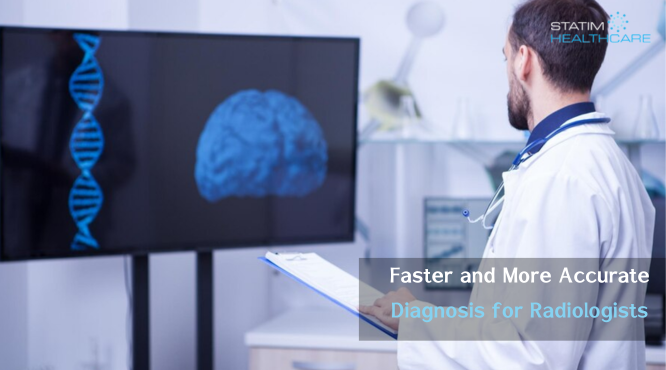Artificial intelligence (AI) has come a long way in the last ten years. Because of advances in computing technology and the abundance of training data, artificial intelligence (AI) applications can now address a wide range of challenging problems in everyday life. Radiology is one of the application areas where AI might reduce the strain of growing demands of medical practitioners, with up to a billion imaging scans performed annually worldwide.
In the realm of diagnostic radiology, the integration of artificial intelligence (AI) has heralded a transformative era, promising faster and more accurate diagnoses. As diagnostic radiology specialists strive for excellence in patient care, the synergy between human expertise and AI-driven technologies emerges as a game-changer.
The Evolution of Radiology Diagnosis
Over the years, diagnostic radiology has evolved significantly, propelled by technological innovations and advancements in medical imaging modalities. Today, radiologists employ a wide array of imaging techniques, including X-rays, computed tomography (CT), magnetic resonance imaging (MRI), and ultrasound, to visualize internal structures and identify abnormalities. However, the interpretation of these complex images often presents challenges, requiring meticulous analysis and expert judgment by radiologists.
What Tangible Advantages Could AI Solutions Provide to Radiology?
Though AI solutions have proven successful in large-scale lab settings, their potential for therapeutic utility in the real world is still uncertain. Ideally, they are made to do a task that radiologists find difficult and/or error-prone. True clinical value can be realized when AI is utilized to assist time-consuming chores like data filtering but human experts are still in charge of making decisions.
Role of AI in Radiological Services
The advent of AI has revolutionized radiological services, empowering radiologists with advanced tools and technologies to enhance diagnostic accuracy and efficiency. AI-driven solutions, developed by the best radiology diagnostic imaging experts, streamline workflows, reduce interpretation times, and improve patient outcomes. From early detection of abnormalities to personalized treatment planning, AI augments the capabilities of radiologists, enabling them to deliver superior care to patients.
Advantages of AI in Diagnostic Radiology
- Enhanced Efficiency: AI algorithms analyze medical images swiftly, accelerating the diagnostic process and reducing turnaround times for radiology reports.
- Improved Accuracy: By leveraging AI, radiologists can achieve greater diagnostic accuracy, minimizing the risk of false positives and false negatives in image interpretation.
- Tailored Treatment Planning: AI-enabled decision support systems provide valuable insights to radiologists, facilitating personalized treatment planning and patient management.
- Workflow Optimization: AI-driven automation streamlines radiology workflows, enabling radiologists to focus on complex cases and critical patient care tasks.
- Continuous Learning: AI algorithms evolve over time, learning from new data and feedback to continually improve diagnostic performance and adapt to changing clinical needs.
Unlocking the Potential of AI in Radiology
As the demand for advanced radiology services in the USA continues to grow, the integration of AI holds immense promise for the future of diagnostic radiology. By harnessing the expertise of diagnostic radiology specialists and leveraging AI-driven technologies, radiological services can achieve unprecedented levels of diagnostic precision and patient care excellence. With a commitment to innovation and collaboration, the best radiological services are embracing AI as a cornerstone of modern radiology practice, paving the way for faster, more accurate diagnoses and improved patient outcomes.
Radiologists can work up to 25% faster with AI
The time radiologists needed to read the exam was reduced by 15.7% when AI support was provided, according to the scientists’ findings. AI support was particularly useful for radiologists, both experienced and rookie, when they were given normal scans. There has been a 25.7% reduction in the reporting times for inexperienced radiologists who find normal images. This finding is especially noteworthy since it offers concrete evidence that artificial intelligence (AI) can serve as a “second read” in common therapeutic contexts.
AI represents a paradigm shift in diagnostic radiology, empowering radiologists with unparalleled capabilities to navigate the complexities of medical imaging and deliver exceptional patient care. As we embrace the transformative potential of AI, we embark on a journey towards a future where faster and more accurate diagnoses are the norm, revolutionizing radiology practice for the betterment of healthcare worldwide.
Statim Healthcare for Accurate Diagnosis
Statim Healthcare. As diagnostic radiology specialists committed to delivering unparalleled quality and innovation, we recognize the significance of leveraging AI technology to enhance diagnostic accuracy and efficiency.
At Statim Healthcare, we understand the evolving landscape of diagnostic radiology and the increasing demands placed on radiologists. With our dedication to excellence and our team of experienced diagnostic radiology specialists, we strive to provide the best radiology diagnostic imaging services in the USA. Our advanced radiology reporting solutions are designed to streamline workflows, reduce interpretation times, and improve patient outcomes.
By harnessing AI-driven technologies, such as machine learning and deep learning algorithms, we empower radiologists to achieve greater diagnostic precision and efficiency. Our state-of-the-art reporting platform integrates seamlessly with existing radiology services, enabling radiologists to focus on complex cases and critical patient care tasks.
With Statim Healthcare, radiologists can confidently navigate the complexities of medical imaging, knowing they have the support of advanced radiology reporting services that prioritize accuracy, efficiency, and patient care excellence.

